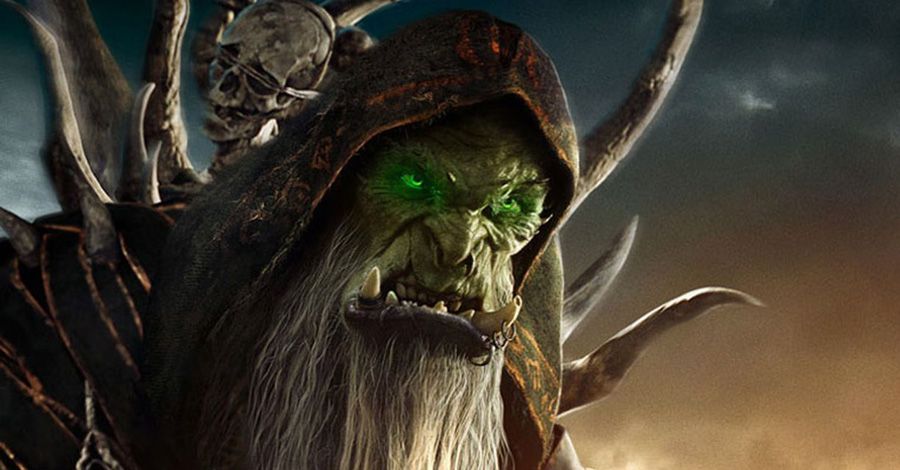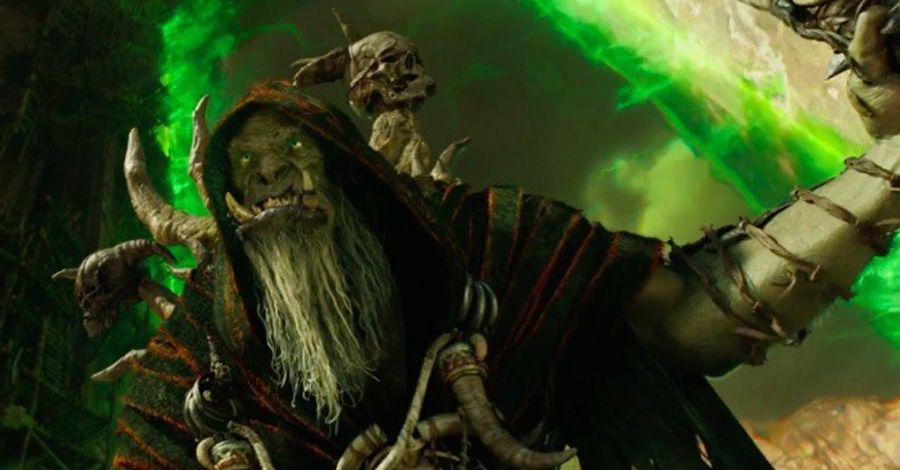While the action, special effects and epic scale of “Warcraft” will undoubtedly draw in movie-goers, it was the “humanistic” aspect of the script that Daniel Wu found most compelling.
The star of AMC’s “Into the Badlands,” in "Warcraft" the Hong Kong-based actor plays Gul’dan, an orc warlock corrupted by dark magic who leads the charge for his kind to abandon their home world and travel to the human kingdom of Azeroth.
The part required Wu not only to use motion-capture technology for the first time, but also to learn how to move like a 9-foot orc, a feat that required its own training school.
On the Vancouver set of the Duncan Jones film, Wu spoke with a handful of journalists about attending orc camp, why his wife insisted he audition for the film, and bringing Gul'dan to the big screen.
The orc characters are all motion-capture. When you auditioned for this role, what did they tell you what was going to be involved?
Daniel Wu: I just knew it was going to be a physically demanding motion-capture character, and I had never done motion-capture before. That was actually part of the attraction of it for me, mainly because you get to play a character that doesn't look like you at all, in any way, but it is your essence. It is your soul. You are acting – and your body movement and your voice is all there – but, in appearance, it's this totally different character. Coming from Hong Kong, coming from China, where I've been doing most of my work, we don't have that technology yet. So it was a really attractive thing for me to work in this mo-cap world.
What was your sense of who Gul'dan is?
He is an orc. He is a magician. He is dealing with this magic called the Fel magic. There is good magic and there is bad magic in this world, and this Fel magic is a corrupting magic for his character. He believes this is what they need to ensure the survival of their species. He's kind of like a mad dictator in some ways, in that he believes this is the only way his species can survive.
RELATED: "Warcraft" Director and Cast Want to Rival "Lord of the Rings"
What is interesting about this script is it's not just humans versus these monsters. There is good and bad in the orc world, and there is good and bad in the human world. It's really about the idea of good and bad in general, and not over any species. It's not just us versus them. There are orcs that are suspicious of the Fel and that are fighting against me and my revolution to use this Fel to save our people. There are some humans that also want to use the Fel to corrupt the human population as well. There's good and evil forces, but it's not because of the species. "We're evil orcs, and all the orcs are evil, and the humans are good." It's a combination of both.
That's the thing that was compelling with Duncan's script is that it's not some simplistic black-and-white world. There's bad and good, just like in humanity – in any race, in any culture or in any country. There's good and bad people in North Korea. There's bad and good people in America. That is what was very real and humanistic about this story.
Did they actually show you a representation of your character so you had that reference?
The amazing thing now about where technology has gone is we can actually see it while we are making it. I'll be in the motion-capture suit acting it out and then when I look at the playback, I can see a rough image of my character. It's not 100 percent there, but it's probably 50 percent there. You'll have an idea of how much space this orc is taking up because they are 9 feet tall and huge people, as well as how your body movement is affecting the movement of that character.
We all had to go to this motion school and learn how to move like an orc, and be like an orc, for three weeks with Terry Notary, who worked on the "Apes" films and very early motion-capture stuff. He taught all us orcs how to be orcs. That whole process was amazing, just the transformation to go from this to that. The great thing again is working on set and being able to see it, and not wait until the premiere to see it.
They did some preliminary tests and they showed us that. That really convinced me this was going to work. When I looked at the test, I thought they had taken the actor's eyes and actually popped them into the character, because they were so real-looking. The moisture in the eyes, the redness in the eyes and the emotion that came across the eyes. … But I realized the actor had blue eyes and the orc had brown eyes, so obviously those were CG eyes. Just little squinting eyes or little tics in the eyes – all that stuff comes through on the mo-cap character. That was so amazing and from that point on, I was like, "OK, this is going to work. This is going to be really interesting and it's going to take whatever we've seen in the motion-capture world to another degree."
Producer Stuart Fenegan was telling us it was actually your wife who encouraged you to take this role.
Because she's a "Warcraft" player, which is actually my fault. I put her onto the game years ago. I stopped playing games more than 10 years ago because I have a really addictive personality and it's not good for work. She started playing the game five or six years ago. I was supposed to take this year off because I just had a baby. I wasn't supposed to take on any work, and this audition came up. I said, "Hold on. I have to ask my wife if I can do this." I said, "Babe, I have an audition for an American movie." She's like, "Well, you can't do it. You promised me you'd take a year off." I go, "But, it's 'Warcraft.'" She goes, "Oh, you have to do it." She was very, very excited.
REVIEW: Don't Believe the Bad Buzz, "Warcraft" Does Right By Fans
Then, she's come to set. She's just shocked. As a gamer, you are in that world for five or six years. She played it four or five hours a night. This was before she got pregnant. She hasn't played since. You invest so much time in it and that world becomes so familiar to you. To see it in real three dimensions – the great thing about this film is that it's not all mo-cap. There are practical sets. The human actors are in costume and makeup. That's very real.
You talked about finding the humanity of a character. What did you have to do to find the inhumanity of the character, whether its movement or attitudes or the pitch in your voice?
The main goal of my character can be very human. He's trying to ensure the survival of his own species and he'll do whatever it takes to do that. He takes the evil path or the wrong path. The physicality and the voice came a lot from the movement school. Especially for my character, he moves a lot different than most of the other orcs. He hunches over. It's very physically demanding. I had to figure out a way to be able to carry off that physically demanding role - and also the emotions and the drama of the character – and meld them together.
It was difficult to do at first, but after working on it every day for weeks, for hours a day, you start to get it. Then, every time I would get into that position, I would feel the orcness of the character come out. But then the themes of the character, what he's striving for and fighting for – that's all talking with Duncan and working it out with Duncan. It's trying not to make Gul'dan an evil pirate "Argghhh" bad guy, but make him have a motivation and something real he's fighting for. Every bad guy doesn't necessarily think he's being bad. He has his own vision of the world and what he wants.
“Warcraft” opens today nationwide.


